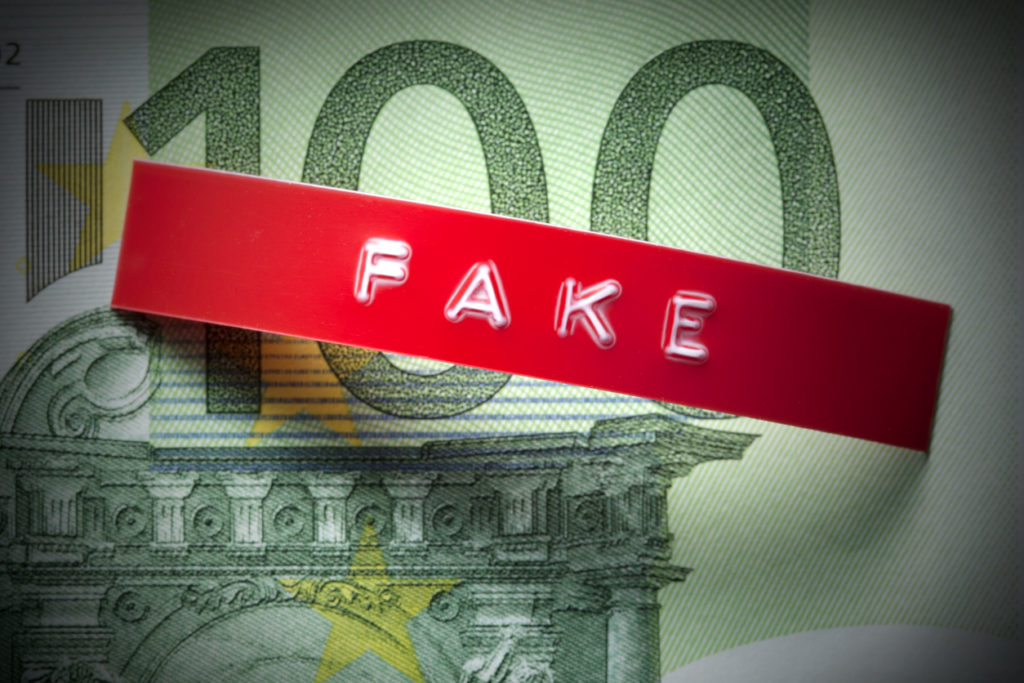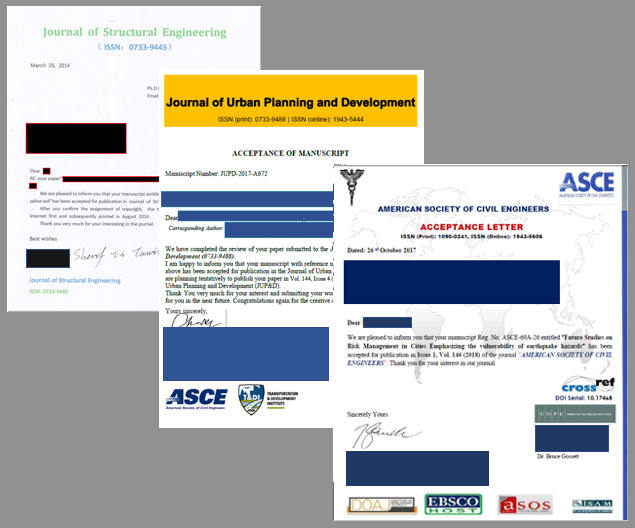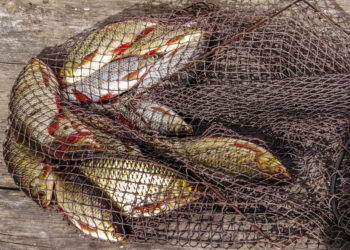Predation. It’s discussed all the time. Predatory journals are scamming unsuspecting authors by promising quick publication, and low, low fees to a never-heard-of-before open access journal. Alternatively, it may be true that some authors are the ones taking advantage of low cost OA in order to push through shoddy work and get credit for it. Conferences are another headache. Researchers attend conferences to get their work published and to network. There is no shortage of conferences promising to do just that only for attendees to realize when they get there that all is not what was advertised. In fact, a new website with a familiar name is offering attendees help in identifying these conferences.

Another scam seems to be taking hold in certain parts of the world. Over the last 5 years, the American Society of Civil Engineers (ASCE) has become aware of seven fake acceptance letters for our journals. Here’s how this goes:
An author contacts us and says, “Thank you for accepting my paper. Your letter said that the paper would be in the December issue but I looked and it’s not there. Please inform me of the new publication date.”
We’ve never seen this paper. The author helpfully provides a copy of the acceptance letter.
The letterhead is similar to ours, though we don’t send accept letters on this letterhead and a map was added to the background. There is no actual journal title. The letter does promise a publication date, which we never provide. There is an editor signature. That’s an ASCE Editor, but not his signature. The other signature belongs to my boss, though his title is wrong.
The letter, as if to convey more legitimacy, includes logos for DOAJ, Crossref, and other various indices. The DOI prefix is incorrect and ASCE does not have an Open Access journal, so none are included in DOAJ.
We received two letters, both from authors in Iran, that look exactly like this one. I suspect that there are others out there.
In another instance, an author asked about publication. He contacted the editor, who broke the bad news that we’ve never seen this paper. This author provided email correspondence. He had come in contact with a man who claimed to be a friend of the editor. This man promised to help get the paper published in the journal. This “friend” collected a submission fee and upon providing a fake acceptance letter, he collected a publication fee. ASCE charges neither. The editor had never heard of this “friend.”
Our first fake acceptance letter was several years ago when a young man asked if we could move the publication of his paper up. The acceptance letter said we would publish it in the August issue and he would prefer June. He provided a letter, signed by the editor, which was a forgery. He sent us an image of a posting on a university bulletin board (the physical kind) that offered to help get papers published in our journal and two other related journals.
Another letter we received was remarkable in its fanfare. The author presented us with a red “PowerPoint” slide looking certificate. It had starbursts blazoned with the word “accepted” and the journal title in big bold letters.

I love a good mystery and so I try to track these things down. I was able to trace still one more letter back to an editing service in China. The author gave me some email correspondence that I was able to match to a URL.
I am very careful about how to respond to these authors. I explain that we don’t have the paper, never did; that we don’t charge fees for submission or publication; and that unfortunately the entire thing is a fraud. I ask for more information:
- Would you mind telling me to whom you submitted your paper?
- What did they promise you?
- Did you pay them any money?
I never hear back from the authors at this point. They are either afraid to get in trouble or embarrassed that they were duped.
I struggle with what to do next. Do I email the institution and let them know that someone took advantage of researchers there? This is especially a concern when there is a flyer posted on a department board, or someone who is in contact with the researcher and pretends to be a friend to the editor.
In these cases, the author is being wronged. It seems like adding fuel to the fire by telling their dean that they were duped. At the same time, we have seen seven cases and there is no way there aren’t a whole lot more out there. Of the seven discovered, two were Iranian authors and five were authors from China.
What about your journals? I talk to other publishers and ask them about these cases all the time. I spoke to a room full of publishers at PSP about this as well. I have only heard of one other publisher finding fake acceptance letters like this. There is no mention on the COPE website of incidents. I find it very hard to believe that ASCE journal authors are predominantly getting caught up in this kind of scam. In other words, if it’s happening with our journals, there is no reason to believe its not happening with yours.
Companies pretending to offer “author services” while employing questionable ethics are not new. Some unscrupulous providers do “manage” the entire submission process for authors and have perpetrated peer review fraud in the process. Others, like the one I was able to track down never submitted the paper to ASCE.
While there are paper mills where the authors clearly know what they are “buying,” the cases I have seen are much more likely to be scamming the authors. These phony services damage the reputation of legitimate language editing services and freelance editors in the same way that predatory journals take a bite out of responsible journals.
So what’s the damage to a specific journal? Nothing really, except that someone is promising acceptance in our journal and misrepresenting a relationship with ASCE. This certainly isn’t the only way journal titles get co-opted to benefit some other group. We regularly find conferences that advertise that the top 10 papers submitted to the meeting will be sent to one of our journals. We may eventually get an email with a zip file containing 10 papers from a conference organizer that we turn away.
It is possible to attempt some legal action against individuals or organizations co-opting journal titles for these purposes. If you can track down the original perpetrator, step one might be to send a cease and desist letter, which has a high likelihood of being ignored.
Now that a definite pattern of abuse has been established for ASCE journals, I am focusing some attention to the matter in our author resources. Here are some ideas all of us could do to help our potential authors.
I suggest adding language to author guides/information/instructions about what an author should expect to happen:
- Only the corresponding author can submit a manuscript
- All papers are submitted to our submission site* (include the URL)
- A confirmation email will be sent to the author upon successful submission (include information about from whom the email will come)
- Give an example of the format of our manuscript numbers
- Explain upfront about fees
- Give an idea of the timeline for first decision and what the typical process looks like (we never accept an original submission)
- Explain that all correspondence related to the review and acceptance of the paper will come from emails generated by the submission system
- Refer authors to the Think.Check.Submit. page for more information.
As publishers, we could certainly choose to do nothing. We are not getting scammed; however, people who want to publish in our journals are getting scammed. My hope is that we can all continue to educate authors to avoid these unfortunate events and also make institutions in other countries where this fraud seems to be centered aware of the issues.
*One reason why authors from outside English speaking countries may feel the need to rely on a helper for submissions is because the submission sites are written by and for English speakers. Many submission systems will offer foreign language translation sites but in the end of the day, we want all the questions answered in English. Still, we can probably do better to watch what we ask for and how we ask for it in order to be more mindful of non-native English speakers.
Discussion
18 Thoughts on "Paper Accepted…Unless the Letter Was Forged"
How can these situations be managed by law?
Whose law? China doesn’t even recognize foreign copyrights.
It’s not really a question of copyright, but more one of fraud. It would have to be pursued by the person who was taken advantage of, along with their institution, and as Angela notes in the post, there may be some social/career pressure against doing that.
Agreed. My observation about copyright was only meant to draw attention to an example of a legal principle affecting publishing that varies somewhat by country. An author/scholar exploited by a fake journal might be more likely to have effective legal recourse in his own country, especially if s/he was defrauded of money as well as a few ounces of dignity. The incidents described involve STEM. It’s hard to imagine this kind of fraud occurring in a less ‘lucrative’ field like mine (European medieval history).
These kinds of forgeries are also a potential problem for journals that make their entire publication process open and transparent. For example, it wouldn’t be difficult to scam authors who submit their papers to F1000Research, as all of the author, reviewer, and editor contact information is public along with details about the paper’s publication status. Similarly, a scammer posing as an editor from PeerJ could send acceptance letters and invoices to authors who have submitted to PeerJ Preprints. Similarly, academics who post public CVs with details like (Journal X. In Publication, 2019) could be setting themselves up for a potential scam.
Astonishing! Why don’t you bring it up at a COPE discussion forum? (next one on April 30: https://publicationethics.org/events/cope-forum-april-2018). I don’t think COPE has ever seen a case like this, hence the lack of guidance. (I am an ex COPE Council member).
I sympathize with foreign scholars trying to crack the English-language journals. Hiring a friend to help edit the manuscript is one thing but I would hope such victims might be counseled by advisers (and warnings on your Scholarly Kitchen site) to avoid agents who promise to grease the wheels toward publication.
Great post, highlighting a lesser discussed problem that takes horrid advantage of inexperienced authors.
I have dealt with fake decisions for people a few times. Luckily, before money changed hands. The authors messaged me to check whether everything was legitimate. It didn’t take long to surmise that it was not.
Most recent example, the scenario played exactly as you describe, with a ‘fixer’ saying they could help submit to the journal. But what they did, was tell the author the journal acronym – JAAR. The author assumed it was the Journal of the American Academy of Religion, which was the JAAR they intended. But they accepted it for Journal if American Academic Research. So the correspondence says JAAR.
Angela – you ask about your case, if you should inform the author institution. I definitely think you should. Raising awareness of these practices is very important. The university will not want its students taken advantage of like this. There will indeed be adverts offering this assistance.
As it happens, I have just landed from Cairo where I have been running workshops on managing journals, and been discussing all of these issues. The information was very well received.
In another quirk of coincidence, it was KnowledgeE who I have been working with in Cairo – they are the company behind the Think.Check.Attend conference website, which you link to in your opening paragraph.
Several years ago an (English-speaking and senior academic who had published with us previously contacted me, asking about the publication date of his manuscript. He did not have a tracking number, and we did not have his paper in our tracking system. He related that he had been contacted by a journal that he thought was us (I think the “The” was not included in the name of the sham journal), which invited him to write an article, which he did, and he paid about two grand in various fees to this journal. Then the journal stopped communication with him, and he contacted me. He was more upset that we wouldn’t publish the article — it didn’t match our focus — than he was about the lost fees, which his state university would try to recoup. He said that he would never write for us again. I have no idea how to combat this kind of crime.
This points to the fact that the scam is not only on the authors but on the targeted journals as well whose brand becomes associated with fraud and villainy.
I’m very curious to know if other journals have experienced this or similar frauds, and what steps publishers have taken to combat journal identity theft in recent years, particularly as online and open access journals boomed.
Trust is essential in the publications world and it’s encouraging that ASCE is making efforts to draw attention to this type of fraud in the community. Many journals include editorial board members’ names and contact information online. This scam seems very easy to complete, and I can imagine many variations of it.
While we publishers can do whatever we can, ultimately the responsibility needs to be shared by universities and research institutions in training their researchers. Such training should involve knowledge of publication models, of recognized journals, of predation awareness, and some official guidelines or checklists covering these.
Lack of well-trained researchers not only leads to low-quality research output but also such frauds continuing to persist. It is in the Universities’ remit to deliver well-trained researchers to the society and to science.
I am an editor and last year I had an Iranian author, who had already submitted his paper to the journal, receive emails that appeared to be from me, asking the author for payment. Thankfully, the author followed up with me before paying and we discovered what was happening. The author’s email account had been compromised and the individuals were able to send emails from what appeared to be my email address. It is important to share this information and educate colleagues and authors to prevent others from being scammed.
This site, http://www.iadces.com, for the so-called International Agency for Development of Culture, Education and Science, states that they have a connection with the University of Chicago to publish in a selection of our journals. We have no such relationship and this organization simply extracts money from unsuspecting scholars by promising to get articles published for them. We heard of this from authors who paid the fee and demanded to know when we would publish. We have complained directly and they have actually removed the links but then they re-appear. They are currently back up once again. Oxford University Press is also listed and I’m sure they do not have a relationship either. We will issue another complaint but I doubt this will be more than a temporary fix. I agree that we need to do all that we can to signpost that we do not charge fees to be published, but there is little we can do to entirely eradicate the problem.
Three years ago I received a query from a University official (in Iran) asking whether a letter of acceptance purporting to be from my journal was genuine; it wasn’t, and looked nothing like anything we send out. Nor had we any record of a submission by the author. The same thing (same University, different author) happened a month or so later, but nothing since.
So there is a variant where it is the author who, presumably, wants to parlay a journal acceptance into some benefit from their employers.
Unfortunately, authors have occasionally reported similar fraud attempts to Elsevier over the past few years, leading to the issuing of warnings such as the following: https://www.elsevier.com/authors-update/story/publishing-ethics/beware-of-fraudulent-emails



